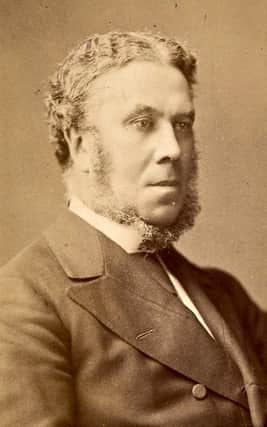Memorial calls for Scotland’s ‘forgotten’ first non-white MP


Now, there are efforts to “rescue from oblivion” the story of Peter McLagan, who as a boy left former British Guiana with his father to be educated in Scotland before becoming the country’s first non-white MP in 1865.
McLagan, who attended school in Peebles and Tillicoutry before taking a place at Edinburgh University, served the seat of Linlithogowshire after winning seven elections in a row.
Advertisement
Hide AdAdvertisement
Hide AdHowever his views on temperance and universal women’s suffrage won him popular favour, as well as his ability to connect with his constituents and bring big ideas to their door.
David Main, of Bathgate, has been researching Peter McLagan’s life and said it was time for a memorial to the former MP in the town to both highlight the man’s achievements and reflect the often complex legacy of Scotland’s role in the slave trade.
He said: "I want to rescue from oblivion the achievements of Peter McLagan. His history has all but been forgotten although he was a much loved and highly respected MP by all accounts.
"I would like to see some sort of memorial to Peter McLagan in Bathgate, not only to tell his own personal story but that of Scotland's links to slavery and all that meant."
Mr Main added: "His style of doing politics was remarkable at the time in that he would talk to his constituents whether they be in Bathgate, Linlithgow, Bo'ness or Whitburn and explain to them his stance on such diverse matters of the day, be that Home Rule for Ireland as well as the need for female doctors which in the 1870s' was highly controversial since it would necessitate the opening of the Scottish universities to women wishing to train as doctors.
"Yet he was also very much a product of his time in that he remained a firm believer in the Empire and of the " great Imperial Family" whilst at the same time earning himself the sobriquet of a "suffragetist in trousers" since he was equally a staunch supporter for women to be given the right to vote.
“Although some of his views on Empire, for instance, and the use of force to preserve it as well as his stance on Temperance as a means of social good have fallen out of favour I would still argue that on a range of other issues he is a credit to Scotland.”
McLagan’s achievements, however, were underpinned by the proceeds of slavery. Born in Demerara in what was is now Guyana on the north coast of South America, his father, also Peter, who was born in Perthshire, part-owned two large coffee plantations.
Advertisement
Hide AdAdvertisement
Hide AdAt the time of abolition, there were 451 slaves held on the plantations co-owned by Peter Snr and Samuel Sandbach, a partner in the Liverpool-based Sandbach, Tinne & Company, a firm with deep Scottish roots that owned ships and plantations across the West Indies.
The men shared the equivalent of £2.1m for the loss of their slaves following abolition and it was with this wealth that the Scot went on to buy the Pumpherston Estate in West Lothian, which was then inherited by the future MP.
At the time of McLagan’s election, candidates could only stand if land of a certain value was owned.
Some national newspapers spoke of his “dark blood” a cartoon known to exist of him depicted as a slave driver.
Nevertheless, he served the constituency for 28 years and resigned only after a business partnership to mine shale oil on his land led to bankrupty and his withdrawl from public duties.
On his death in 1900, he was buried Mid Calder with the funeral closing schools and businesses and a service noting his “kind heart and simple life”.
Alison Clark, a PhD candidate at Edinburgh University who is researching Anglo-Scots merchants in the West Indies and the rise of Sandbach Tinne & Co questioned whether a memorial to Peter McLagan was suited to a civic space given his links to the slave trade.
Ms Clark, who is also trying to trace Peter McLagan’s mother, said: "We live in a multi-ethnic society and I think that our civic spaces should contain art or statues that bring people together, rather than divide or offend.
Advertisement
Hide AdAdvertisement
Hide Ad"I think these are quite complex and emotional stories involving slavery and racism that require quite a bit of explanation and context and generally I think the place for statues like these are in an open-air museum of slavery or empire where you can do that.
"We should be proud of Peter McLagan being Scotland's first BME Member of Parliament, but you also have to recognise that his land and wealth came directly from the plantations and enslaved Africans his father owned in Guyana. I am not sure that this is the time to be putting that connection with racialised slavery on a pedestal, certainly not without a lot of consultation with the BME community first.”
A message from the Editor:Thank you for reading this story on our website. While I have your attention, I also have an important request to make of you.With the coronavirus lockdown having a major impact on many of our advertisers - and consequently the revenue we receive - we are more reliant than ever on you taking out a digital subscription.Subscribe to scotsman.com and enjoy unlimited access to Scottish news and information online and on our app. With a digital subscription, you can read more than 5 articles, see fewer ads, enjoy faster load times, and get access to exclusive newsletters and content. Visit https://www.scotsman.com/subscriptions now to sign up.
Our journalism costs money and we rely on advertising, print and digital revenues to help to support them. By supporting us, we are able to support you in providing trusted, fact-checked content for this website.
Joy Yates
Editorial Director